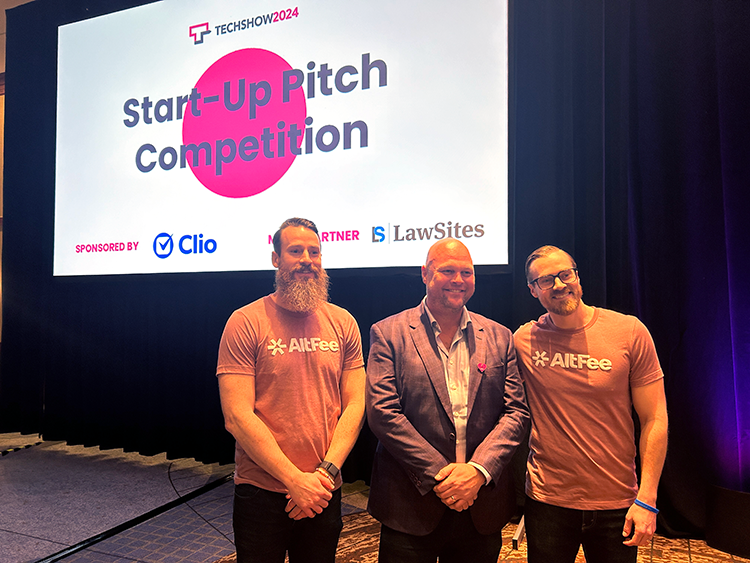Legal startups focus on need for speed at ABA Techshow 2024's Startup Alley competition

Jack Newton, the founder and CEO of Clio, is flanked by Digby C. Leigh (left) and Scott Leigh of Altfee. Altfee won first place in the ABA Techshow 2024 Startup Alley competition. (Photo by Victor Li / ABA Journal)
Speed, augmented by generative artificial intelligence, was the clear winner at the opening night of the ABA Techshow 2024, as 15 startups competed to win the annual startup pitch competition, aka Shark Tank for legal tech companies.
The competitors created various technologies they believed lawyers could use in their practice—and the common denominators were products that would save firms time and money.
“Can you please raise your hand if you love the billable hour?” asked Scott Leigh, the co-founder and CEO of AltFee, a legal pricing and fixed-fee management software company based in Vancouver. One hand popped up in a standing-room-only ballroom at the Hyatt Regency in Chicago during the spirited kick-off to the ABA Techshow Wednesday evening. “Almost without fail, the worst part of the job has to do with the billable hour. AI equals efficiency equals billable tasks taking less time,” Leigh says.
AltFee, which launched in 2022, was voted the winner of the eighth annual competition. Instead of relying on the traditional billable hour, AltFee is a technology that helps firms align pricing with tasks—many of which are done by AI. The company believes that 89% of law firms earn the same or more when pricing with AltFee.
But AltFee wasn’t the only winner in the room. TechShow attendees were also impressed by Skribe.ai, which was awarded second prize. Skribe.ai is designed to boost productivity by 25 percent by automating legal processes.
“Attorneys are tired of overpaying,” says Karl Seelbach, attorney and co-founder of Skribe.ai. Seelbach focused his 3-minute presentation on depositions, which can cost more than $800 an hour and 2-3 weeks to transcribe using a court reporter. He says technology like his can do this in the time it takes to grab a cup of coffee.
Follow along with the ABA Journal’s coverage of the ABA Techshow 2024 here.
“In a perfect world, you can take the legal testimony without time or cost barriers,” he says.
Time and cost are valid concerns—but another major issue mentioned frequently during the competition was AI-related security breaches. That’s a problem that Paxton AI—a Portland-based company that launched 6 months ago—aims to solve.
Paxton, which snagged third place at the ABA startup competition, is designed to work as a legal AI assistant that will learn to write just like its user. It purports to write briefs, motions and more, while accessing more than 60 million documents to help without hallucinating. Paxton includes citations for all of its claims, and it uses its own legal language modes and only the data uploaded to its system, rather than outsourcing to OpenAI to prevent any security issues.
“We help transform legal work,” says Tanguy Chau, the CEO and co-founder of Paxton.
Other startups, including Beagle, Civille and Altumatim, shared how their startups could transform the legal technology world by making searches faster, by increasing traffic to firms’ sites and to harness the power of AI to reduce the time it takes to review documents.
With the common theme of stop-watches cueing the passing of time and seconds ticking by on the large screens behind the presenters, it was clear to the competitors that lawyers are tired of wasting their time on just about everything. They don’t want to read through thousands of pages of documents; they don’t want to type email after redundant email; and they want to locate their drafts with the click of a button.
“Imagine how much time that can save on a daily basis,” says Blake Adam, the co-founder and CEO of Startup Alley competitor Gretchen, an AI-powered legal email-drafting technology.



